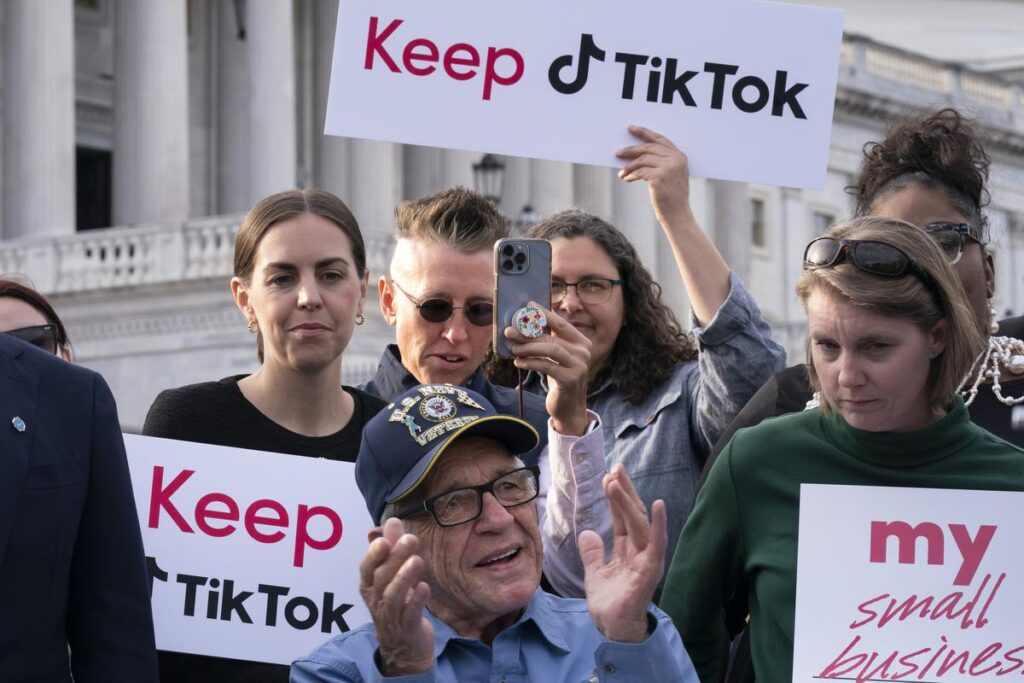The looming threat of a TikTok ban in the United States has sent shockwaves through the community of content creators who rely on the platform for their livelihood. The future of TikTok in the US hangs in the balance, and nowhere is the tension more palpable than among the app’s lifeblood: its creators. As a potential ban looms on the horizon, a chorus of voices, from viral dance stars to niche educators, is rising in protest. Their message? A ban would be a devastating blow to their careers, their communities, and the creative landscape itself.
The proposed legislation, currently making its way through the House, cites national security concerns as the primary reason for potentially TikTok ban, which is owned by the Chinese tech giant ByteDance. But for many creators, this justification feels like a flimsy excuse for a decision that could dismantle their livelihood.
Building Empires, Facing Uncertainty
Amber Estenson, a comedian known as “That Midwestern Mom,” built her online empire on TikTok. Her quirky cooking videos, featuring unorthodox combinations like Snickers bar salads, catapulted her to viral fame and a million-strong following. “This isn’t just fun for me,” Estenson says. “It’s my job. A ban would be like ripping the rug out from under me.”
Estenson’s story is far from unique. Countless creators, from musicians who found their breakout hit on the platform to educators who use TikTok to make complex topics engaging, have carved out successful careers on the app. The potential loss of their audience and the carefully cultivated communities they’ve built is a terrifying prospect.
TikTok is not just a social media platform but a significant source of income through brand sponsorships, partnerships, and sales facilitated by TikTok’s features. The potential TikTok ban threatens not only their ability to reach audiences but also their financial stability, pushing them to explore alternative platforms like Instagram and YouTube.

Beyond Entertainment: A Platform for Education and Advocacy
The impact of a ban wouldn’t be limited to lighthearted entertainment. Dr. Betsy Green, a neurosurgeon with nearly 2 million followers, uses TikTok to give the public a glimpse into the life of a medical professional. “There’s so much misinformation out there,” she says. “Platforms like TikTok allow us to combat that with accurate, engaging content.”
For social justice advocates, TikTok has become a powerful tool for raising awareness and mobilizing action. Activists have used the platform to organize protests, share educational content about marginalized communities, and hold authorities accountable. A ban on TikTok could stifle these vital voices and hinder crucial social movements.
The Scramble for Alternatives: A Patchwork Solution?
Aware of the potential consequences, some creators are scrambling to build a presence on alternative platforms like Triller. However, transitioning audiences and rebuilding communities is a daunting task. The unique algorithm and features of TikTok, which have demonstrably helped creators go viral, are difficult to replicate elsewhere.
“There’s a reason TikTok is so popular,” says David Lee, a tech explainer with a massive following. “It’s not just about the trends or dances. It’s about the platform fostering a sense of community and discovery.” Lee worries that a patchwork of alternative platforms wouldn’t be able to capture the magic of TikTok, leaving creators and audiences fragmented.
Free Speech Concerns and the Stifling of Creativity
The potential TikTok ban also raises concerns about free speech and the chilling effect it could have on online creativity. While national security is a valid concern, critics argue that a complete ban is a blunt instrument. They advocate for stricter regulations and data security measures that address specific issues without silencing millions of creators.
The debate surrounding TikTok’s ban extends beyond economic implications to national security concerns, with experts warning about data privacy issues and potential misuse of user data by China. While some argue for the ban citing security risks associated with TikTok’s data practices, others like former President Donald Trump oppose it, highlighting political motivations and competition between social media platforms.
The uncertainty surrounding TikTok’s future has prompted creators to diversify their presence across multiple platforms to mitigate potential losses and maintain connections with their audiences.
“This isn’t just about a silly app,” says Sarah Jones, a musician who gained national recognition after her song blew up on TikTok. “It’s about a platform that empowers people to express themselves and connect with others. Shutting it down feels like a step backward for creative freedom.”
The Fight Continues: A Call for Dialogue
Content creators are not going down without a fight. Many are taking to their platforms to raise awareness, urging their followers to contact their representatives. They’re also lobbying for a more nuanced approach that addresses national security concerns while protecting the creative ecosystem that TikTok has fostered.
The potential TikTok ban is a complex issue with no easy answers. However, the voices of creators deserve to be heard in the conversation. Their concerns about livelihoods, communities, and free expression are a crucial part of the equation. Ultimately, the fate of TikTok in the US will depend on whether lawmakers can find a solution that balances security with the undeniable creative and social power of the platform.
The potential TikTok ban is not just a matter of app regulation but a critical issue affecting the livelihoods and creative expressions of content creators who have built communities and businesses on the platform. The decisions made in the coming days will have far-reaching consequences for the digital landscape and the individuals who rely on these platforms for their careers.

